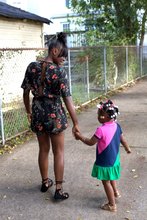0
Publication
Community:
Nov 15, 2023
Homelessness and child welfare system involvement pose substantial challenges for families, but supportive housing can help them stay together and access secure housing.
Authored by: Michael Pergamit, Mary K. Cunningham for Urban Institute
Topics: Advocacy, Dual-generation, Healthy homes, Homelessness, Housing, Low-income, Stability
 Shared by Molli Caite Hughes
Shared by Molli Caite Hughes
Molli Caite Hughes posted a
on Nov 15, 2023
Michael Pergamit, Mary K. Cunningham for Urban Institute
Homelessness and child welfare system involvement pose substantial challenges for families, but supportive housing can help them stay together and access secure housing.
0
Video
Community:
Jun 17, 2022
The Vancouver Housing Authority collaborated with a Federally Qualified Health Center and a homeless crisis response system to develop a network of scattered-site and site-based supportive housing. This moderated discussion will cover how VHA paired Housing Choice Vouchers and public housing with a Medicaid-funded supportive housing benefit to serve people identified by the community’s Coordinated Entry as needing supportive housing. Speakers will also discuss the challenges faced through the process, model adjustments made, and evaluation of the work through matching housing data and Medicaid utilization data.
Authored by:
Topics: Advocacy, CLPHA, Data sharing, Family engagement, Health, Healthy homes, Homelessness, Housing, Legislation & Policy, Low-income, Research, Stability, Sustainability
 Shared by Karina George
Shared by Karina George
Karina George posted a
on Jun 17, 2022
The Vancouver Housing Authority collaborated with a Federally Qualified Health Center and a homeless crisis response system to develop a network of scattered-site and site-based supportive housing.
0
Report
Community: Postsecondary
May 2, 2019
Innovative public housing authorities (PHAs) are collaborating with college access partners and community colleges to increase postsecondary educational achievement for low-income residents and college students experiencing homelessness. This report elevates 11 shared learnings from a recent convening of these five pioneering PHAs and their postsecondary collaborators, and offers a series of recommendations to policy makers, PHAs, and philanthropic organizations seeking to develop emerging cross-sector collaborations between housing and education organizations. The report also includes an overview of the federal policies that support and limit postsecondary achievement for students served by PHAs, and profiles of the five partnerships: CHA and partners City Colleges of Chicago and One Million Degrees; CMHA and partner Columbus State Community College; HACLA and partner Southern California College Access Network (SoCal CAN); LMHA and partner Family Scholar House; and THA and partner Tacoma Community College.
Authored by: Abra Lyons-Warren for CLPHA
Topics: CLPHA, Education, Housing, Legislation & Policy, Low-income, Partnerships, Post-secondary, Stability
 Shared by Abra Lyons-Warren
Shared by Abra Lyons-Warren
Abra Lyons-Warren posted a
on Oct 6, 2020
Abra Lyons-Warren for CLPHA
Innovative public housing authorities (PHAs) are collaborating with college access partners and community colleges to increase postsecondary educational achievement for low-income residents and college students experiencing homelessness.
0
Publication
Community:
Founded in 1995 as Project Women, Family Scholar House (FSH) provides comprehensive, holistic services for disadvantaged single parents, their children, and foster alumni. The nonprofit seeks to end the cycle of poverty and transform communities by empowering families and youth to succeed in education and life-long self-sufficiency. FSH provides supportive housing, educational programming, and participant advocacy to help families gain independence.
Authored by: American Planning Association
Topics: Dual-generation, Early childhood, Education, Homelessness, Housing, Low-income, Partnerships, Place-based, Post-secondary, South, Stability
 Shared by Mica O'Brien
Shared by Mica O'Brien
Mica O'Brien posted a
on Apr 18, 2019
American Planning Association
Founded in 1995 as Project Women, Family Scholar House (FSH) provides comprehensive, holistic services for disadvantaged single parents, their children, and foster alumni.
0
Research
Community:
Nov 22, 2018
Improved access to health insurance contributed to reducing worry and stress associated with paying rent/mortgage or purchasing meals among low-income people. Expanding health insurance access may have contributed to increasing the disposable income of low income groups.
Authored by: Shiho Kino, Koryu Sato, and Iciro Kawachi for International Journal for Equity in Health
Topics: Affordable Care Act, Health, Housing, Low-income, Medicaid / Medicare, Mental health, Research, Stability
 Shared by Mica O'Brien
Shared by Mica O'Brien
Mica O'Brien posted a
on Mar 7, 2019
Shiho Kino, Koryu Sato, and Iciro Kawachi for International Journal for Equity in Health
Improved access to health insurance contributed to reducing worry and stress associated with paying rent/mortgage or purchasing meals among low-income people. Expanding health insurance access may have contributed to increasing the disposable income of low income groups.
0
News Article
Community:
Mar 5, 2019
Disasters are becoming more common in America. In the early and mid-20th century, fewer than 20 percent of U.S. counties experienced a disaster each year. Today, it's about 50 percent. According to the 2018 National Climate Assessment, climate change is already driving more severe droughts, floods and wildfires in the U.S. And those disasters are expensive. The federal government spends billions of dollars annually helping communities rebuild and prevent future damage. But an NPR investigation has found that across the country, white Americans and those with more wealth often receive more federal dollars after a disaster than do minorities and those with less wealth. Federal aid isn't necessarily allocated to those who need it most; it's allocated according to cost-benefit calculations meant to minimize taxpayer risk.
Authored by: Rebecca Hersher and Robert Benincasa for NPR
Topics: Community development, Funding, Housing, Legislation & Policy, Low-income, Racial inequalities, Research, Stability
 Shared by Mica O'Brien
Shared by Mica O'Brien
Mica O'Brien posted a
on Mar 7, 2019
Rebecca Hersher and Robert Benincasa for NPR
Disasters are becoming more common in America. In the early and mid-20th century, fewer than 20 percent of U.S. counties experienced a disaster each year. Today, it's about 50 percent.
0
Publication
Community:
Feb 27, 2019
Over the past two decades, criminal justice reform has focused on evidence-based interventions to prevent arrests and incarceration and to facilitate community reintegration. These initiatives represent a movement toward a less punitive, more holistic approach to public safety, targeting critical social factors that lead to and perpetuate criminal justice involvement. Because housing problems are often a key underlying factor for people’s involvement with the criminal justice system, there are ways housing interventions can help lessen criminal justice involvement. Decriminalizing homelessness, for example, can reduce rates of initial arrest and incarceration, especially for people with low-level, nonviolent offenses. A sufficient supply of affordable housing and supportive services could help people stabilize after their release from jail and reduce the likelihood of recidivism. Policymakers, advocates, and practitioners in housing and criminal justice systems can partner to promote and evaluate housing strategies that divert people from the criminal justice system.
Authored by: Kimberly Burrowes for How Housing Matters (Urban Institute)
Topics: Criminal justice, Homelessness, Housing, Legislation & Policy, Low-income, Research, Stability
 Shared by Mica O'Brien
Shared by Mica O'Brien
Mica O'Brien posted a
on Feb 28, 2019
Kimberly Burrowes for How Housing Matters (Urban Institute)
Over the past two decades, criminal justice reform has focused on evidence-based interventions to prevent arrests and incarceration and to facilitate community reintegration.
0
Publication
Community:
Jan 31, 2019
For many years, the vulnerabilities of children experiencing homelessness have been glossed over on the assumption that their innate resilience would overcome the impact of homelessness. As someone who worked in the field, I would often hear, “Oh, they’ll never remember.” Today we know better. We know more about how the brain develops and about how trauma impacts brain development. There is a growing recognition among providers that these early years are critical for establishing a foundation for emotional, mental, and physical wellbeing, and that we don’t get a second chance at early childhood.
Authored by: Carol Klocek for SchoolHouse Connection
Topics: Early childhood, Education, Homelessness, Housing, Low-income, Research, Safety, Stability
 Shared by Housing Is
Shared by Housing Is
Housing Is posted a
on Feb 21, 2019
Carol Klocek for SchoolHouse Connection
For many years, the vulnerabilities of children experiencing homelessness have been glossed over on the assumption that their innate resilience would overcome the impact of homelessness. As someone who worked in the field, I would often hear, “Oh, they’ll never remember.” Today we know better.
0
News Article
Community:
Feb 12, 2019
The Board of Supervisors on Tuesday gave the green light for San Diego County to apply for up to $125 million in state funding to help people get off the streets and receive mental health treatment.
Authored by: Alexander Nguyen for Times of San Diego
Topics: Funding, Homelessness, Housing, Legislation & Policy, Low-income, Mental health, Stability, Substance abuse, West Coast
 Shared by Mica O'Brien
Shared by Mica O'Brien
Mica O'Brien posted a
on Feb 14, 2019
Alexander Nguyen for Times of San Diego
The Board of Supervisors on Tuesday gave the green light for San Diego County to apply for up to $125 million in state funding to help people get off the streets and receive mental health treatment.
0
Publication
Community:
Jan 24, 2019
Affordable housing campaigns are not new, of course, but what is unprecedented and transformative about Opportunity Starts at Home is the scope and diversity of the partners that are joining forces to advocate for more robust and equitable federal housing policies. The campaign is advised by a Steering Committee including leading national organizations representing a wide range of interests that are working shoulder-to-shoulder to solve the affordable housing crisis.
Authored by: Opportunity Starts at Home
Topics: Asset building, Child welfare, CLPHA, Community development, Early childhood, Education, Food insecurity, Funding, Health, Homelessness, Housing, Immigrants, Legislation & Policy, Low-income, Mobility, Out-of-school time, Partnerships, Racial inequalities, Safety, Seniors, Stability, Substance abuse, Youth
 Shared by Mica O'Brien
Shared by Mica O'Brien
Mica O'Brien posted a
on Jan 24, 2019
Opportunity Starts at Home
Affordable housing campaigns are not new, of course, but what is unprecedented and transformative about Opportunity Starts at Home is the scope and diversity of the partners that are joining forces to advocate for more robust and equitable federal housing policies.
0
Publication
Community:
Quality affordable housing can be a “vaccine” which prevents long-term health problems and promotes healthy, productive lives. When a family’s housing situation is unaffordable and unstable, chances to lead a healthy life dwindle rapidly.
Authored by: Opportunity Starts at Home
Topics: Child welfare, Health, Homelessness, Housing, Low-income, Partnerships, Seniors, Stability
 Shared by Mica O'Brien
Shared by Mica O'Brien
Mica O'Brien posted a
on Jan 18, 2019
Opportunity Starts at Home
Quality affordable housing can be a “vaccine” which prevents long-term health problems and promotes healthy, productive lives. When a family’s housing situation is unaffordable and unstable, chances to lead a healthy life dwindle rapidly.
0
News Article
Community:
Jan 14, 2019
The San Jose Unified School District has its own plan: raze aging school buildings, send their students to new facilities, and turn that land into affordable rental housing for at least 300 teachers and school workers.
Authored by: Dana Goldstein for The New York Times
Topics: Education, Housing, Low-income, Partnerships, Stability, West Coast
 Shared by Mica O'Brien
Shared by Mica O'Brien
Mica O'Brien posted a
on Jan 17, 2019
Dana Goldstein for The New York Times
The San Jose Unified School District has its own plan: raze aging school buildings, send their students to new facilities, and turn that land into affordable rental housing for at least 300 teachers and school workers.
0
News Article
Community:
Jan 16, 2019
In 2018, over half a million people experienced homelessness on a given night in the US. Of those, roughly one in three experienced unsheltered homelessness in a car, outside, or in other places not meant for human habitation.
Authored by: Aaron Shroyer How Housing Matters
Topics: Homelessness, Housing, Low-income, Stability, Supportive housing
 Shared by Housing Is
Shared by Housing Is
Housing Is posted a
on Jan 17, 2019
Aaron Shroyer How Housing Matters
In 2018, over half a million people experienced homelessness on a given night in the US. Of those, roughly one in three experienced unsheltered homelessness in a car, outside, or in other places not meant for human habitation.
0
Publication
Community:
Oct 9, 2018
Women with children, especially, stay hidden in fear of losing custody of their children. As a result, we will never see them camping in tents or in downtown parks.
Authored by: Mary Ellen Mitchell for SchoolHouse Connection
Topics: Early childhood, Homelessness, Housing, Legislation & Policy, Low-income, Safety, Stability
 Shared by Mica O'Brien
Shared by Mica O'Brien
Mica O'Brien posted a
on Jan 11, 2019
Mary Ellen Mitchell for SchoolHouse Connection
Women with children, especially, stay hidden in fear of losing custody of their children. As a result, we will never see them camping in tents or in downtown parks.
0
News Article
Community:
Jan 10, 2019
Island School is one of 247 “community schools” in New York. These are regular public schools, with a twist. They have longer days and longer school years: Island stays open 12 hours a day, six days a week, including spring and winter breaks as well as the summer. A psychologist makes weekly rounds. A dentist comes by regularly. So does an optometrist, and students who need glasses get them free.
Authored by: David L. Kirk for The New York Times
Topics: Community development, Dual-generation, East Coast, Education, Family engagement, Homelessness, Housing, Low-income, Mental health, Metrics, Partnerships, Stability, Youth
 Shared by Mica O'Brien
Shared by Mica O'Brien
Mica O'Brien posted a
on Jan 10, 2019
David L. Kirk for The New York Times
Island School is one of 247 “community schools” in New York. These are regular public schools, with a twist. They have longer days and longer school years: Island stays open 12 hours a day, six days a week, including spring and winter breaks as well as the summer.
0
Interactive
Community:
A building-level interactive map that shows where residential tenants face displacement pressure and affordable apartments are threatened across New York City. Monthly reports on new harassment and displacement risk in rent-stabilized buildings by Community District and color-coded by risk factors.
Authored by: Association for Neighborhood & Housing Development
Topics: East Coast, Housing, Low-income, Stability
 Shared by Mica O'Brien
Shared by Mica O'Brien
Mica O'Brien posted a
on Dec 21, 2018
Association for Neighborhood & Housing Development
A building-level interactive map that shows where residential tenants face displacement pressure and affordable apartments are threatened across New York City. Monthly reports on new harassment and displacement risk in rent-stabilized buildings by Community District and color-coded by risk factors.
0
Publication
Community:
Apr 10, 2018
State and local governments are debating and adopting new landlord-tenant laws and pilot programs, such as expanded legal representation and just-cause eviction requirements. Yet, few housing experts understand evictions well enough to channel the demand for change into clarity about specific eviction problems and potential solutions. Now is the time for policymakers and advocates to get smart. Here are five strategies for policymakers to consider as they address America’s eviction crisis.
Authored by: Maya Brennan for Urban Institute
Topics: Housing, Legislation & Policy, Low-income, Research, Stability
 Shared by Mica O'Brien
Shared by Mica O'Brien
Mica O'Brien posted a
on Dec 21, 2018
Maya Brennan for Urban Institute
State and local governments are debating and adopting new landlord-tenant laws and pilot programs, such as expanded legal representation and just-cause eviction requirements.
0
Publication
Community:
Oct 1, 2016
This report examines strategies used by local governments to address rising housing costs and displacement of low-income households in gentrifying neighborhoods. To assist tenants at risk of displacement, the report details strategies to regulate the landlord/tenant relationship well as strategies to provide assistance for households that move. To create and preserve affordable housing, the report explores ways to use city-owned land and other resources strategically to promote affordable housing in areas where costs are on the rise. It also examines ways to harness the market, such as inclusionary zoning and linkage fees. The report is part of an ongoing series of work by the NYU Furman Center on gentrification, but is the first to provide an overview of policy responses to the effects rapidly rising rents.
Authored by: Jessica Yager, Luke Herrine, and Nadia Mian for NYU Furman Center
Topics: Community development, Housing, Low-income, Stability
 Shared by Mica O'Brien
Shared by Mica O'Brien
Mica O'Brien posted a
on Dec 21, 2018
Jessica Yager, Luke Herrine, and Nadia Mian for NYU Furman Center
This report examines strategies used by local governments to address rising housing costs and displacement of low-income households in gentrifying neighborhoods.
0
Publication
Community:
Dec 1, 2018
New York City’s UAC has generated substantial interest as other jurisdictions across the U.S. consider or implement similar programs. In June 2018, San Francisco voters approved a ballot initiative requiring the city to establish, fund, and run a program to provide legal representation to all tenants facing eviction regardless of income. The Los Angeles City Council approved a motion in August 2018 instructing the housing department to develop recommendations for a new eviction defense bill or program.
Authored by: Vicki Been, Deborah Rand, Nicole Summers, and Jessica Yager for NYU Furman Center
Topics: Housing, Legislation & Policy, Low-income, Stability
 Shared by Mica O'Brien
Shared by Mica O'Brien
Mica O'Brien posted a
on Dec 21, 2018
Vicki Been, Deborah Rand, Nicole Summers, and Jessica Yager for NYU Furman Center
New York City’s UAC has generated substantial interest as other jurisdictions across the U.S. consider or implement similar programs.
0
Research
Community:
Aug 19, 2018
On the 50th anniversary of the Fair Housing Act, there is growing discussion and concern about gentrification. In almost every American city, long-time residents feel increasingly
anxious that they will be priced out of their homes and communities, as growing numbers of higher-income, college-educated households opt for downtown neighborhoods. Yet when looking through the lens of fair housing, gentrification also offers a glimmer of hope, as the moves that higher-income, white households make into predominantly minority,
lower-income neighborhoods are moves that help to integrate those neighborhoods, at least in the near-term. The key question is whether this integration will last and help to deliver on the promise of the Fair Housing Act to promote and further integrated living. Inverting the famous words of community organizer Saul Alinsky, this integration may only be the time between when the first white moves in and the last family of color moves out.
Authored by: Ingrid Gould Ellen and Gerard Torrats-Espinosa for NYU Furman Center
Topics: Community development, Housing, Low-income, Mobility, Racial inequalities, Research, Stability
 Shared by Mica O'Brien
Shared by Mica O'Brien
Mica O'Brien posted a
on Dec 19, 2018
Ingrid Gould Ellen and Gerard Torrats-Espinosa for NYU Furman Center
On the 50th anniversary of the Fair Housing Act, there is growing discussion and concern about gentrification.
0
Webinar
Community:
Dec 11, 2018
CLPHA’s Education Working Group hosts a webinar including presentations on efforts from the Chicago Housing Authority to work with residents on pursuing postsecondary opportunities, as well as an update from HUD’s Office of Policy Development & Research on data collection around tracking and increasing FAFSA utilization.
Authored by: CLPHA
Topics: CLPHA, Cost effectiveness, Data sharing, Education, Funding, Housing, Housing Is Working Group, Low-income, Metrics, Midwest, Post-secondary, Research, Stability, Youth
 Shared by Mica O'Brien
Shared by Mica O'Brien
Mica O'Brien posted a
on Dec 12, 2018
CLPHA’s Education Working Group hosts a webinar including presentations on efforts from the Chicago Housing Authority to work with residents on pursuing postsecondary opportunities, as well as an update from HUD’s Office of Policy Development & Research on data collection around tracking and inc
0
News Article
Community:
Dec 10, 2018
As state and federal officials increasingly search for ways to curb rising health care costs, a decades-old idea is gaining traction: helping people with challenges that have nothing to do with medical care but everything to do with their health.
Authored by: Misty Williams for Roll Call
Topics: Cost effectiveness, Food insecurity, Health, Homelessness, Housing, Low-income, Medicaid / Medicare, Nutrition, Partnerships, Preventative care, Stability, Transportation
 Shared by Mica O'Brien
Shared by Mica O'Brien
Mica O'Brien posted a
on Dec 10, 2018
Misty Williams for Roll Call
As state and federal officials increasingly search for ways to curb rising health care costs, a decades-old idea is gaining traction: helping people with challenges that have nothing to do with medical care but everything to do with their health.
0
Publication
Community:
Dec 1, 2018
With collectively more than 100 years of policy expertise and values-based leadership between us, Ascend at the Aspen Institute and the Housing Opportunity and Services Together initiative at the Urban Institute partnered to develop a set of recommendations on how to harness assisted housing and public-private housing partnerships for better outcomes for families.
Authored by: The Urban Institute and ASCEND: The Aspen Institute
Topics: Dual-generation, Early childhood, Education, Family engagement, Health, Housing, Low-income, Place-based, Research, Stability
 Shared by Mica O'Brien
Shared by Mica O'Brien
Mica O'Brien posted a
on Dec 6, 2018
The Urban Institute and ASCEND: The Aspen Institute
With collectively more than 100 years of policy expertise and values-based leadership between us, Ascend at the Aspen Institute and the Housing Opportunity and Services Together initiative at the Urban Institute partnered to develop a set of recommendations on how to harness assisted housing and pub
0
News Article
Community:
Nov 30, 2018
The city and county of Durham, GoTriangle and the Durham Housing Authority are committed to enhancing opportunities for existing low-income families as well as to increasing the production of affordable housing. The light-rail project is critical to the success of these goals, and the success of these goals is critical to the light-rail project.
Authored by: Anthony Scott and John Tallmadge for The Herald Sun
Topics: Community development, Funding, Housing, Legislation & Policy, Low-income, Partnerships, South, Stability, Transportation
 Shared by Mica O'Brien
Shared by Mica O'Brien
Mica O'Brien posted a
on Dec 3, 2018
Anthony Scott and John Tallmadge for The Herald Sun
The city and county of Durham, GoTriangle and the Durham Housing Authority are committed to enhancing opportunities for existing low-income families as well as to increasing the production of affordable housing.
0
Publication
Community:
Nov 28, 2018
Housing instability among families and children can be detrimental to child welfare, health, economic, and other outcomes. Policymakers and service providers in these fields should consider weaving housing into their approaches. Treating instability at its roots can relieve the trade-offs and stress that emerge when no decent housing is affordable. Evidence indicates that affordable housing can improve a range of outcomes for families and—in combination with short-term or long-term services—help providers tackle complex challenges head-on.
Authored by: Aaron Shroyer for The Urban Institute
Topics: Child welfare, Family engagement, Housing, Low-income, Stability, Supportive housing
 Shared by Mica O'Brien
Shared by Mica O'Brien
Mica O'Brien posted a
on Nov 29, 2018
Aaron Shroyer for The Urban Institute
Housing instability among families and children can be detrimental to child welfare, health, economic, and other outcomes. Policymakers and service providers in these fields should consider weaving housing into their approaches.
 Shared by Molli Caite Hughes
on Nov 15, 2023
Shared by Molli Caite Hughes
on Nov 15, 2023
 Shared by Karina George
on Jun 17, 2022
Shared by Karina George
on Jun 17, 2022
 Shared by Abra Lyons-Warren
on Oct 6, 2020
Shared by Abra Lyons-Warren
on Oct 6, 2020





 Shared by Housing Is
on Feb 21, 2019
Shared by Housing Is
on Feb 21, 2019



 Shared by Housing Is
on Jan 17, 2019
Shared by Housing Is
on Jan 17, 2019









